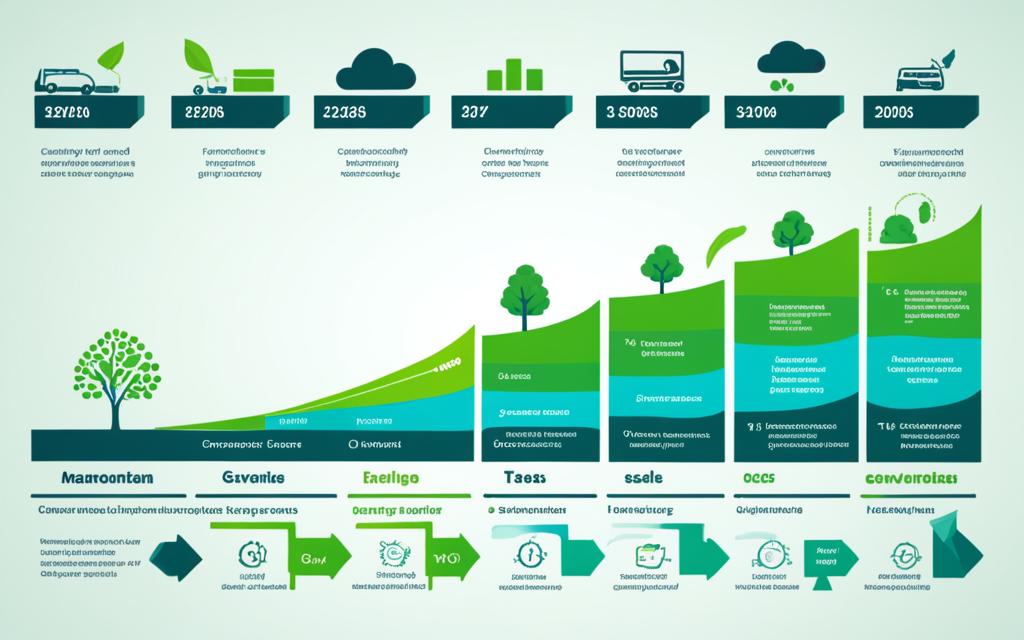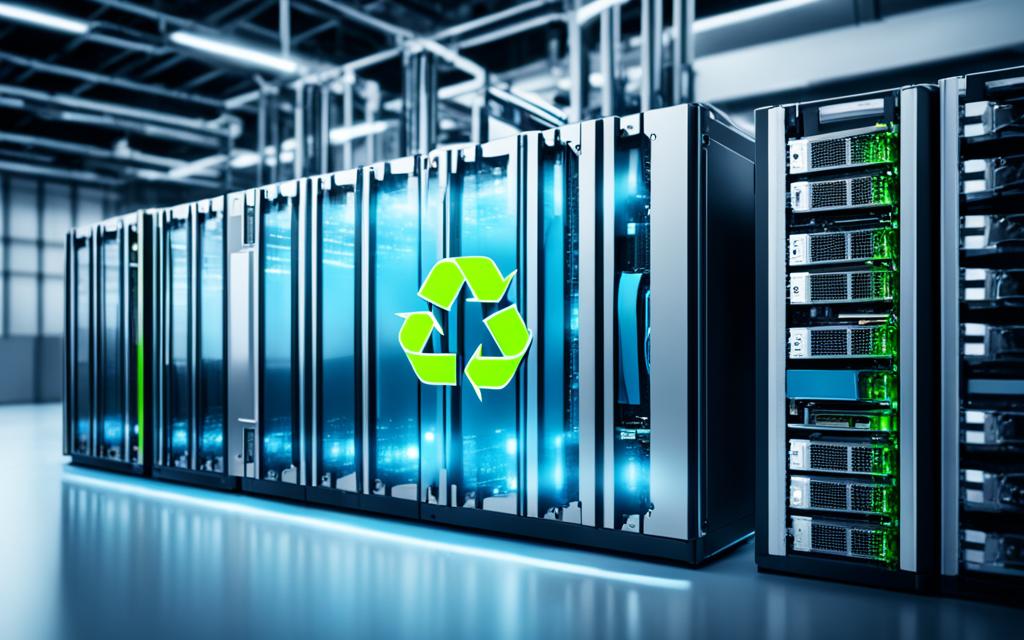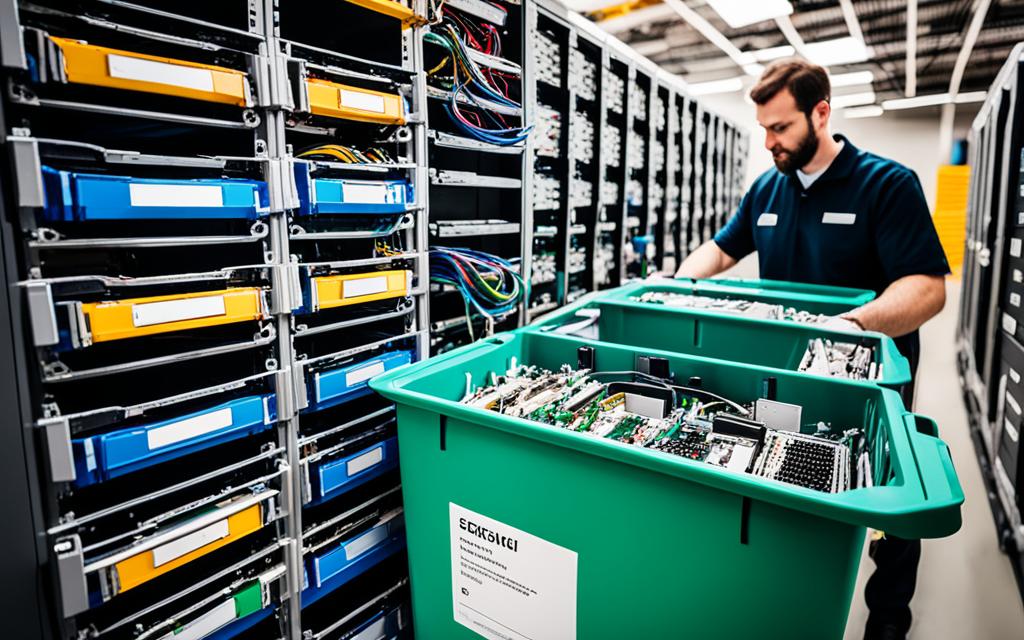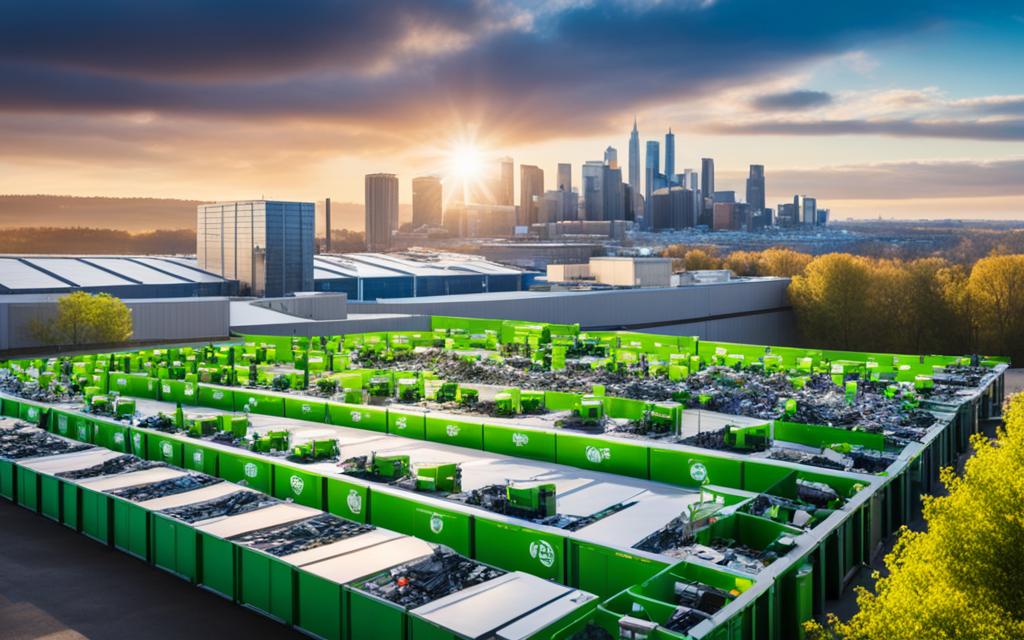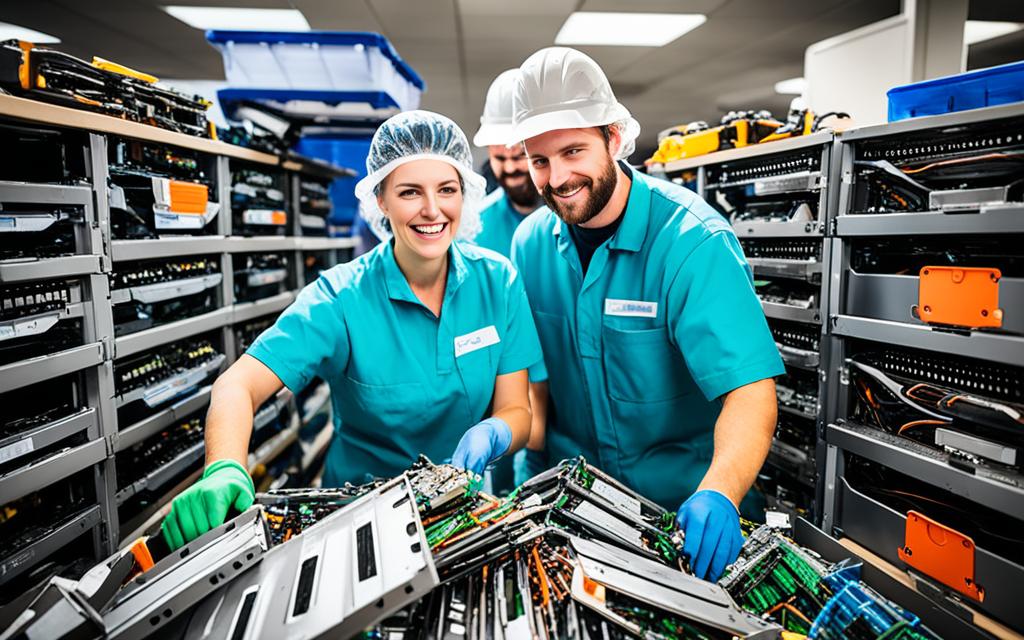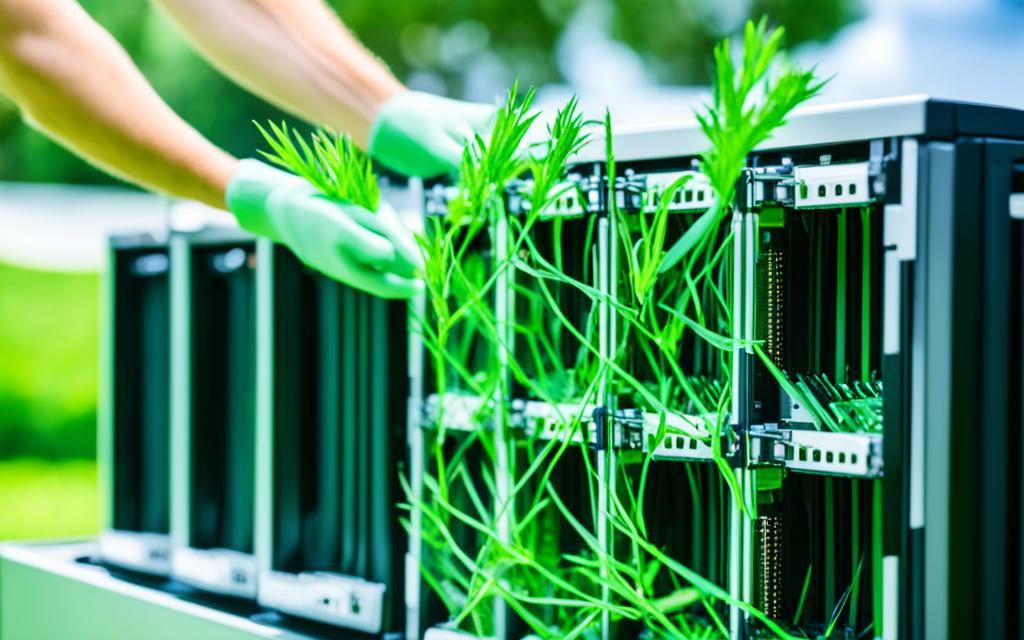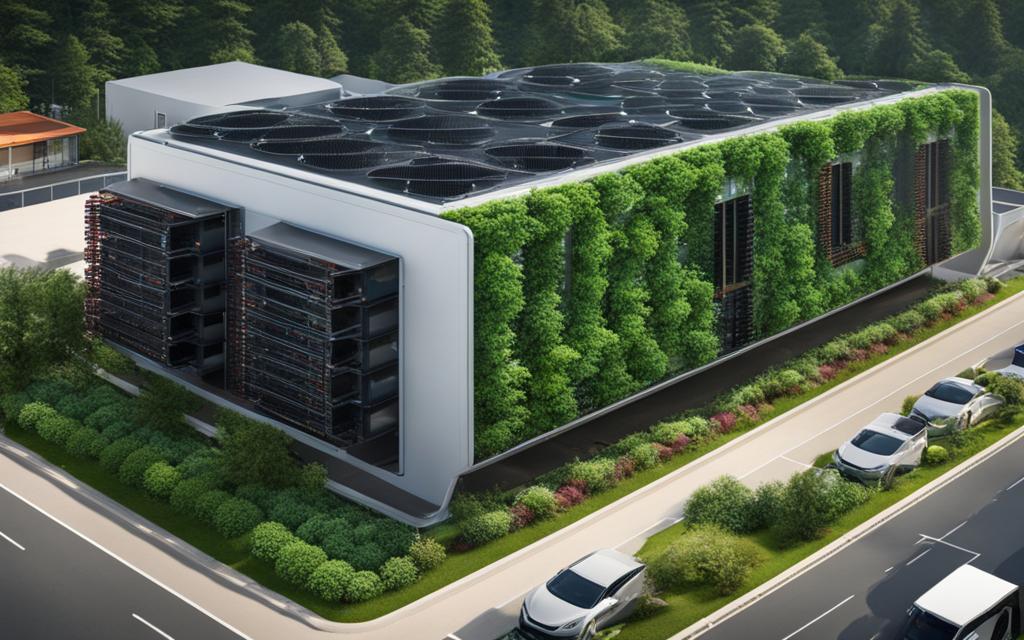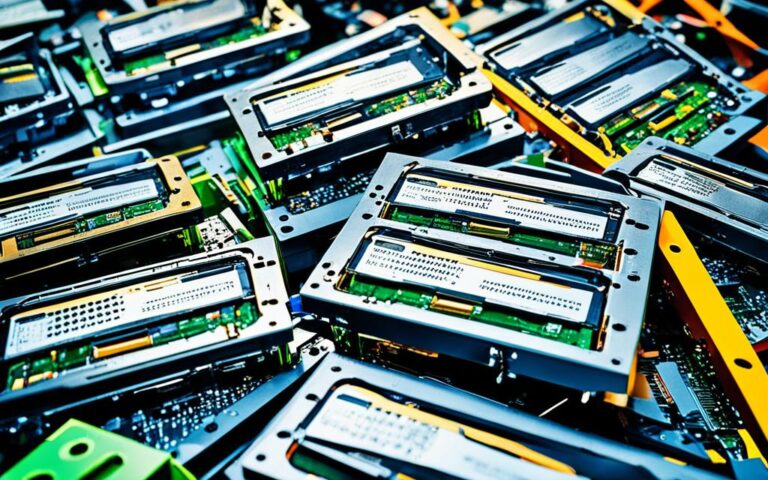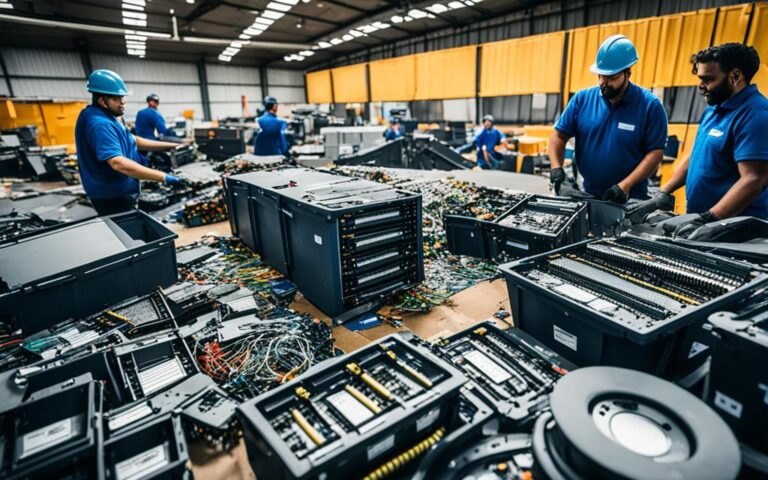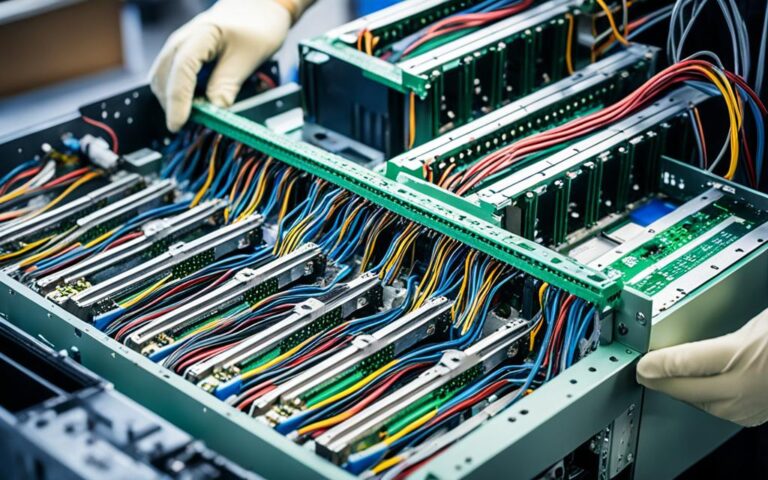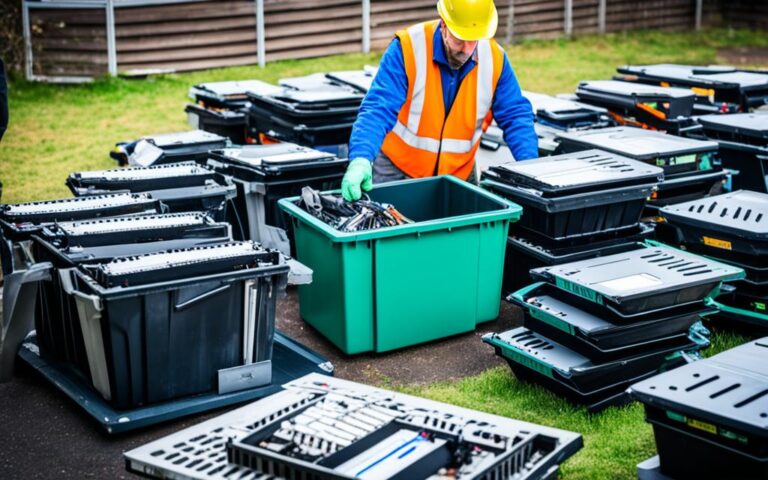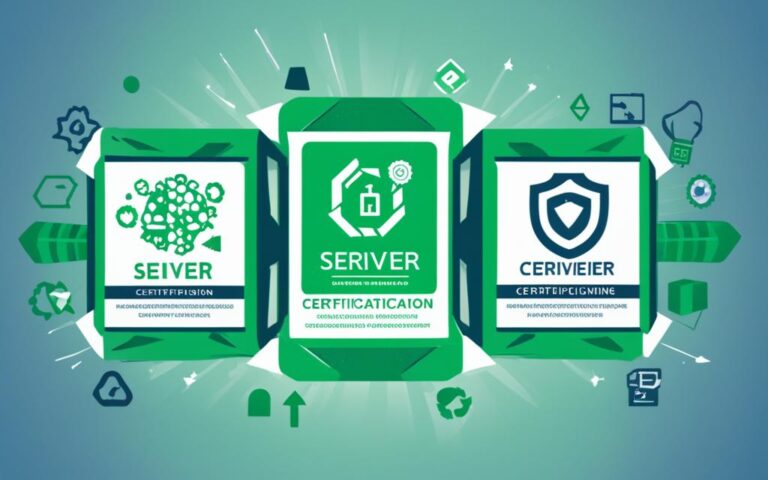The Importance of Lifecycle Assessment in Server Recycling
As we strive towards a sustainable tech future, it is essential to recognize the significance of Lifecycle Assessment (LCA) in the process of server recycling. LCA is a comprehensive method that allows us to analyze the environmental impact of a product throughout its entire lifespan. By considering every step, from manufacturing to disposal or destruction, LCA provides valuable insights into a product’s environmental footprint.
With the rapid advancement of technology and the increasing need for server recycling, understanding the environmental costs associated with these processes is crucial. LCA helps us identify areas for improvement and implement strategies that lead to more sustainable practices. By optimizing server recycling processes, we can reduce waste, conserve resources, and create a greener and more sustainable future.
What is Life Cycle Assessment and How Does it Differ from Embodied Carbon?
Life Cycle Assessment (LCA) is a comprehensive method used to evaluate the environmental impact of a product throughout its entire life cycle. Unlike embodied carbon, which focuses solely on the greenhouse gases emitted during production, LCA considers a wide range of environmental factors such as resource use, water consumption, and waste generation.
Embodied carbon, on the other hand, is a subset of LCA that measures the carbon emissions associated with the production and manufacturing of a product. While it provides valuable insights into the carbon footprint of a product, LCA offers a more holistic view by accounting for other environmental impacts as well.
LCA enables organizations to identify areas of improvement and make informed decisions to enhance the sustainability of their products. By embracing LCA, businesses can quantify their environmental impact and implement strategies to reduce resource consumption, waste generation, and overall environmental footprint.
“Life Cycle Assessment goes beyond just carbon emissions and takes into account the entire environmental impact of a product, providing a comprehensive understanding of its sustainability.” – Jane Smith, Sustainability Manager
By considering factors such as energy use, material sourcing, manufacturing processes, transportation, and end-of-life disposal, LCA allows organizations to develop product sustainability metrics and set targets for improvement. This methodology is vital for promoting eco-friendly practices throughout the product life cycle and driving positive change.
Here is a comparison between Life Cycle Assessment (LCA) and embodied carbon:
| Aspect | Life Cycle Assessment (LCA) | Embodied Carbon |
|---|---|---|
| Scope | Considers the entire product life cycle, including production, use, and end-of-life stages. | Focuses only on the carbon emissions associated with product production. |
| Environmental Impacts | Examines a comprehensive range of environmental factors such as energy use, water consumption, waste generation, and carbon emissions. | Focuses solely on carbon emissions and does not consider other environmental impacts. |
| Comprehensiveness | Provides a holistic evaluation of a product’s environmental performance. | Offers a more specific analysis of carbon emissions but does not provide a broader environmental perspective. |
| Decision-Making | Enables informed decision-making by identifying areas for improvement and implementing sustainable practices. | Helps guide decisions related specifically to carbon emissions reduction. |
By using LCA, organizations can gain a comprehensive understanding of their environmental impact and develop strategies to enhance product sustainability. This approach not only minimizes environmental harm but also contributes to the overall goal of a more sustainable future.
The Benefits of Life Cycle Assessment in Understanding Environmental Costs
Life Cycle Assessments (LCAs) provide companies and individuals with valuable insights into the environmental costs associated with their products. In the technology industry, LCAs play a critical role in identifying and understanding the environmental impact of producing new devices and components.
By conducting comprehensive LCAs, organizations gain a holistic understanding of a product’s environmental footprint throughout its entire lifecycle, from production to disposal. This knowledge enables them to make more informed decisions and promote responsible disposal practices.
- Extend product lifespan: By understanding the environmental impact of their products, organizations can take measures to extend the lifespan of technology. This can be achieved through repairs, upgrades, or selling devices to refurbishment specialists. By doing so, organizations not only reduce e-waste and pollution but also preserve valuable resources.
- Promote responsible disposal: LCAs highlight the importance of responsible disposal practices. By properly disposing of electronic devices at certified recycling centres or participating in take-back programs, organizations minimize the environmental impact associated with product disposal and contribute to a more sustainable future.
- Inform decision-making: LCAs provide organizations with data-driven insights that can inform decision-making processes. By understanding the environmental costs associated with different products and their lifecycle stages, organizations can make informed choices that prioritize sustainability and minimize environmental harm.
The technology industry has a significant role to play in reducing its environmental impact. By harnessing the power of Life Cycle Assessment, organizations can gain a deeper understanding of the environmental costs associated with their products, leading to more responsible practices and a more sustainable future.
“Understanding the environmental costs of our products is crucial for making sustainable decisions and minimizing our impact on the planet.” – Sarah Thompson, Sustainability Director at Tech Solutions Ltd.
Techbuyer’s Role in Sustainable IT Solutions
Techbuyer is a global provider of sustainable IT solutions dedicated to improving the impact of technology on the planet. They offer a wide range of services and products aimed at promoting sustainability in the IT industry.
One of the key areas where Techbuyer focuses is IT hardware procurement. They provide sustainable alternatives for purchasing IT equipment, ensuring that businesses can make eco-conscious decisions while still meeting their technological needs. By offering a range of refurbished, pre-owned, and remanufactured IT hardware, Techbuyer extends the lifespan of devices and reduces the demand for new production.
In addition to procurement, Techbuyer also offers services for the disposal of IT hardware. They understand the importance of responsible e-waste management and work towards minimizing the environmental impact of IT equipment at the end of its lifecycle. Techbuyer facilitates the proper disposal and recycling of IT hardware, ensuring that valuable resources are conserved and harmful substances are handled safely.
Another aspect of Techbuyer’s sustainable IT solutions is their commitment to IT lifecycle services. These services include repairs, upgrades, and refurbishment of IT equipment, helping businesses maximize the lifespan of their devices. By providing these services, Techbuyer reduces electronic waste and contributes to resource conservation and emissions reduction.
Overall, Techbuyer plays a crucial role in promoting sustainable practices in the IT industry. Their dedication to extending the lifespan of IT hardware, managing embodied carbon, and minimizing e-waste makes them a valuable partner for businesses seeking eco-friendly IT solutions.
Why Choose Techbuyer for Sustainable IT Solutions?
- Techbuyer offers a wide range of sustainable alternatives for IT hardware procurement.
- They provide services for the responsible disposal and recycling of IT hardware.
- Techbuyer specializes in IT lifecycle services, including repairs, upgrades, and refurbishment.
- By choosing Techbuyer, businesses can reduce environmental impact and contribute to a sustainable future.
“Techbuyer’s commitment to sustainability and their comprehensive range of IT solutions make them an ideal partner for businesses looking to reduce their environmental footprint.”
By partnering with Techbuyer, businesses can not only optimize their IT operations but also contribute to a more sustainable future by minimizing e-waste, conserving resources, and reducing their carbon footprint.
| Benefits of Techbuyer’s Sustainable IT Solutions | Sustainable IT Solutions by Techbuyer |
|---|---|
| Extended lifespan of IT equipment | IT hardware procurement |
| Reduction in e-waste | Disposal and recycling services |
| Resource conservation | IT lifecycle services |
| Emissions reduction |
The Role of Life Cycle Assessment in Waste Recycling System Design
Life Cycle Assessment (LCA) plays a central role in designing waste recycling systems based on product life cycle evaluation. By assessing the environmental impacts of different waste management methods, including recycling, LCA helps identify the most environmentally beneficial solutions. This evaluation considers the complete life cycle of a product, from production to disposal, and aims to increase the use rate of waste products. LCA provides valuable insights and data for developing waste management frameworks and improving waste recycling systems in terms of reliability, complexity, impact on throughput, and cost.
When it comes to Waste Recycling, sustainability and environmental impact are paramount. By integrating Life Cycle Assessment into waste recycling system design, organizations can gain a comprehensive understanding of the product’s environmental footprint and identify key areas for improvement. This approach considers the entire life cycle of the product, from its initial production to its eventual disposal, and evaluates the environmental impact at each stage.
Through life cycle evaluation, it becomes possible to assess the environmental impacts associated with different waste management approaches, including recycling. LCA provides valuable insights into which methods yield the greatest environmental benefits, allowing organizations to optimize their waste recycling systems accordingly.
The aim is to maximize the use rate of waste products by efficiently recycling them, minimizing environmental harm, and promoting a circular economy.
“Our waste recycling systems must be designed with sustainability in mind, ensuring that we address the environmental impacts at every stage of a product’s life cycle.”
The Benefits of Life Cycle Assessment in Waste Recycling System Design
1. Environmental Impact Evaluation: Life Cycle Assessment allows for a comprehensive evaluation of the environmental impact associated with different waste management methods, helping organizations make informed decisions to minimize harm.
2. Improved Waste Management Frameworks: By integrating LCA into waste recycling system design, organizations can develop more effective and efficient waste management frameworks that prioritize sustainability.
3. Reliability and Complexity Optimization: LCA provides insights into the reliability and complexity of waste recycling systems, allowing for their optimization to maximize efficiency and minimize environmental impacts.
4. Cost Reduction: By analyzing the life cycle of waste products, organizations can identify cost-saving opportunities, such as increased efficiency and reduced waste disposal expenses.
| Benefits of Life Cycle Assessment in Waste Recycling System Design | Description |
|---|---|
| Environmental Impact Evaluation | Provides a comprehensive evaluation of the environmental impact associated with different waste management methods. |
| Improved Waste Management Frameworks | Enables the development of more effective and efficient waste management frameworks. |
| Reliability and Complexity Optimization | Allows for the optimization of waste recycling systems to maximize reliability and minimize complexity. |
| Cost Reduction | Identifies cost-saving opportunities through increased efficiency and reduced waste disposal expenses. |
By harnessing the power of Life Cycle Assessment, waste recycling systems can be designed to minimize environmental impacts, optimize resource utilization, and contribute to a more sustainable future.
The Steps Involved in Conducting a Life Cycle Assessment
Conducting a Life Cycle Assessment involves several steps that help organizations gain a comprehensive understanding of a product’s environmental footprint and guide decision-making towards more sustainable practices.
- Inventory Analysis: This step involves identifying and quantifying the inputs and processes associated with a product’s life cycle. It includes analyzing energy and resource use throughout production, use, and disposal stages.
- Impact Assessment: Once the inventory analysis is complete, the next step is to categorize and quantify the environmental outputs and impacts of the product’s life cycle. This assessment considers factors like air and water pollution, carbon emissions, and resource depletion.
- Interpretation Phase: In this final phase, measurable and attainable goals for mitigating environmental impact and improving the product’s life cycle are derived. It involves interpreting the data collected during the inventory and impact assessments to drive sustainability initiatives.
By following these steps, organizations can gain valuable insights into their product’s environmental impact, identify areas for improvement, and make informed decisions that contribute to a more sustainable future.
Applying Life Cycle Assessment to Waste Recycling and Waste Information Security
Waste recycling has become an increasingly important aspect of sustainable waste management systems. To truly understand the environmental impact of different recycling methods, organizations can leverage the power of Life Cycle Assessment (LCA). By incorporating LCA into waste management systems, businesses can design more efficient and effective waste recycling processes that consider the complete life cycle of a product.
LCA evaluates the environmental impact of each stage in a product’s life cycle, including production, use, and disposal. By conducting a thorough analysis, organizations can identify areas for improvement and make informed decisions to minimize their environmental footprint. This approach maximizes the environmental benefits of waste recycling, contributing to a more sustainable future.
In addition to managing the environmental impact, LCA can also be applied to address waste information security. With the increasing concerns surrounding data privacy and cybersecurity, organizations must ensure the reliability, stability, and cost-effectiveness of their waste recycling processes. By implementing LCA in waste information security management systems, businesses can safeguard sensitive data while maintaining their commitment to sustainability.
Benefits of applying LCA to waste recycling and waste information security:
- Minimizing environmental impact through optimized waste recycling processes
- Improving resource efficiency and reducing waste in the production cycle
- Enhancing data security and privacy during waste recycling
- Identifying cost-effective solutions for waste management and recycling
By harnessing the power of LCA, organizations can align their waste management practices with environmental objectives while addressing the critical issue of waste information security. This holistic approach enables businesses to create a more sustainable waste management system that not only reduces environmental impact but also protects valuable data. Together, these efforts pave the way for a greener and more secure future.
Comparing the Environmental Impact of Different Waste Recycling Methods
| Recycling Method | Environmental Impact |
|---|---|
| Mechanical Recycling | Reduces greenhouse gas emissions by 30% compared to landfill disposal |
| Chemical Recycling | Offers a higher recycling rate but requires more energy |
| Biological Recycling | Less energy-intensive but limited in its application |
| Upcycling | Provides creative solutions for waste materials, reducing the need for new resources |
The table above highlights the environmental impact of different waste recycling methods. It demonstrates the potential benefits and trade-offs associated with each approach, enabling organizations to make informed decisions based on their specific environmental goals and priorities.
Conclusion
Lifecycle Assessment (LCA) is a critical tool in optimizing server recycling processes to pave the way for a sustainable tech future. By conducting a thorough analysis of a product’s environmental impact throughout its entire lifecycle, organizations can identify areas for improvement and make more environmentally responsible decisions. This includes reducing e-waste, preserving valuable resources, and minimizing the overall environmental footprint.
Techbuyer, a global provider of sustainable IT solutions, is at the forefront of promoting a greener approach to technology. Their dedication to sustainability is evident through their commitment to implementing LCA in waste recycling systems. By embracing these practices, organizations can contribute to a more sustainable future and play their part in addressing the challenges of waste management and environmental preservation.
Through the application of LCA in waste recycling systems, organizations can design more efficient and effective processes. By considering the entire lifecycle of a product, including production, use, and disposal, they can create comprehensive waste management frameworks that maximize environmental benefits and reduce negative impacts. The incorporation of LCA also ensures the reliability, stability, and cost-effectiveness of waste recycling processes, addressing issues related to waste information security and management.
By embracing LCA and partnering with sustainability-focused companies like Techbuyer, organizations can not only optimize server recycling but also contribute to a more sustainable future. By making informed decisions and taking responsible actions, we can reduce e-waste, preserve valuable resources, and minimize the environmental impact of our operations, paving the way towards a more sustainable and environmentally-friendly tech industry.
FAQ
What is Lifecycle Assessment (LCA)?
Lifecycle Assessment (LCA) is a crucial method for analyzing the environmental impact of a product throughout its entire lifespan.
How does LCA differ from embodied carbon?
While embodied carbon focuses on greenhouse gases released during production, LCA examines a wider range of environmental impacts, including water and material use.
What are the benefits of LCA in understanding environmental costs?
LCA provides companies and individuals with insights into the environmental costs associated with their products, allowing them to make more informed decisions and promote responsible disposal practices.
What is Techbuyer’s role in sustainable IT solutions?
Techbuyer is a global provider of sustainable IT solutions dedicated to improving the impact of technology on the planet.
What is the role of LCA in waste recycling system design?
LCA plays a central role in designing waste recycling systems based on product life cycle evaluation.
What are the steps involved in conducting a Life Cycle Assessment?
The steps involved in conducting a Life Cycle Assessment include Inventory Analysis, Impact Assessment, and Interpretation Phase.
How can LCA be applied to waste recycling and waste information security?
LCA can be applied to waste recycling systems to evaluate the environmental impact of different recycling methods and ensure the reliability and cost-effectiveness of waste recycling processes.
What is the importance of Lifecycle Assessment in server recycling?
Lifecycle Assessment plays a crucial role in optimizing server recycling processes for a sustainable tech future.

